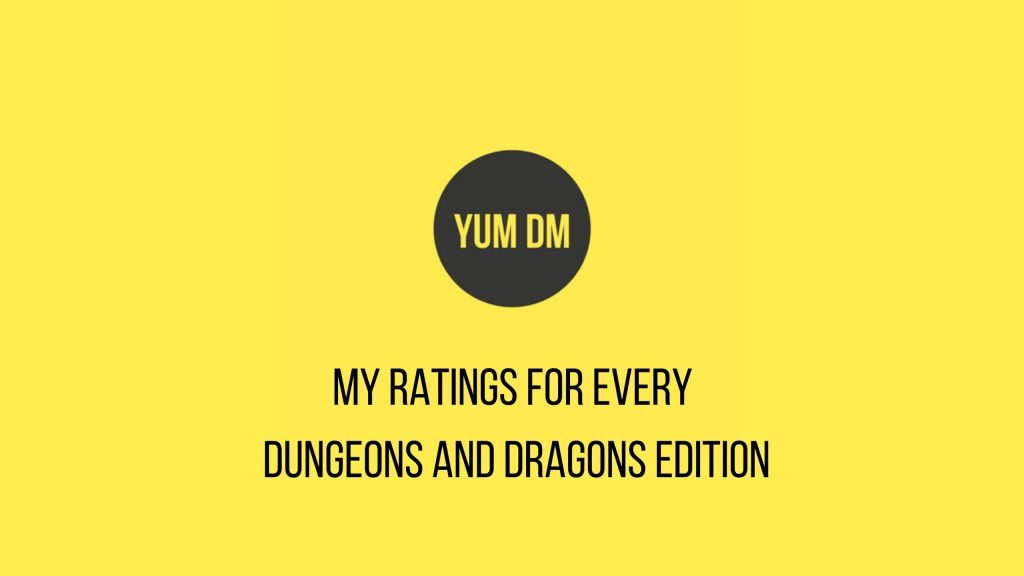
I thought it would be fun to rate each edition of D&D.
This is completely down to personal taste and you are free to agree or disagree (feel free to do so in the comments below).
I have also added in some strengths and weaknesses for each. As well as a short blurb.
I am also going to be honest and upfront and say I have not played every edition – some of the earlier editions I haven’t played as I started with AD&D and haven’t had a chance to go back and play them all. I have noted this where appropriate.
Dungeons & Dragons—original edition (OD&D)
I have not played this version.
Dungeons & Dragons—Holmes Basic
I have not played this version.
Dungeons & Dragons—BX version / Moldvay Basic
Score: 7/10
Strengths: Simple and straight forward. Easy to learn and to hack.
Weaknesses: Races as classes and maybe a little too simple.
Over All: A real breakthrough at the time, making D&D even more accessible and easy to play.
Dungeons & Dragons—BECMI version / Mentzer Basic (Basic Rules only)
Score: 8/10
Strengths: Easy to understand rules – a great way to get into D&D.
Weaknesses: Only went to 3rd level and probably too much focused on entry level (although that was its purpose).
Over All: A really cool way to start off with D&D. Two books – one for the player and one for the GM – is all you need to get started with the world’s longest running TTRPG.
Dungeons & Dragons—Rules Cyclopedia version
I have not played this version.
Advanced Dungeons & Dragons—1st Edition (AD&D)
Score: 7/10
Strengths: An intricate system that works well as a whole and, once mastered, provides everything you need.
Weaknesses: Convoluted writing style and layout. Difficult to master.
Advanced Dungeons & Dragons 2nd Edition
Score: 8/10
Strengths: A workable system that is backward compatible with AD&D, with a slew of optional rules. More streamlined rules.
Weaknesses: Maybe too many options. Could lead to bloat and confusion.
Over All: AD&D 2nd edition was a breath of fresh air design-wise from AD&D. It laid out rules and new options side-by-side which were easy to understand.
Advanced Dungeons & Dragons 2nd Edition—Revised
Score: 6.5/10
Strengths: A slew of options where given in the expanded core books, but otherwise the same as 2nd edition above.
Weaknesses: An unnecessary reprint that had bad artwork and design that had nothing on what came before or after.
Over All: In the dying days of second edition, the re-release of the rules saw all the core books reprinted and a series of books that gave many optional rules to the already option-obsessed game.
Dungeons & Dragons—3rd Edition
Score: 8.5/10
Strengths: A unified system that delivers a streamlined and effective game, packaged in a series of beautiful tomes. Strong skill system. Fantastic character options.
Weaknesses: Verbose language.
Over All: Third-edition D&D delivers a beautiful set of rules with a focus on character creation and development. It’s rules work perfectly together under a unified D20 system. It is seen as a little crunchy as it seems to want to have a rule for everything, but what it makes up for in crunchiness it delivers as a solid mid-power level edition.
Dungeons & Dragons— 3rd Edition Revised (v.3.5)
Score: 7.5/10
Strengths: A unified system that delivers a streamlined and effective game.
Weaknesses: Verbose language and an obsession with combat. Unneeded additional rules.
Over All: D&D 3.5 was released as a money-making exercise by Wizards of the Coast and moved D&D into a more combat-focused, mini-focused combat game. In the process, it lost some of the charm of 3rd edition.
Dungeons & Dragons—4th Edition
Score: 3/10
Strengths: Unified mechanics. Some nice artwork.
Weaknesses: A game better suited to a skirmish war game than a roleplaying game. Too much of an obsession with creating builds that were perfectly balanced.
Over All: Fourth edition really leant into the war game roots of Dungeons and Dragons and as a result lost a lot of the roleplaying focus that earlier editions maintained.
Dungeons & Dragons—5th Edition
Score: 4/10
Strengths: Simple enough mechanics, ease of play.
Weaknesses: Broken skills system, a focus on high fantasy/high magic, and a system that traded away flavour for simplicity.
Over All: D&D 5e was the great hope for Wizards of the Coast. Having been surpassed in sales and fans by Paizo’s Pathfinder, they needed a way back into the market. By focusing on the core of what Dungeons and Dragons was, they managed to create a game that was easily playable (from a modern gaming standpoint) and digestible by old and new fans alike.
Unfortunately, they have more recently moved in a new direction, ignoring older fans completely for a new target market and has produced an even more vanilla TTRP than previously.
While You’re Here…
Since 2021 I have been publishing d12 Monthly, a monthly zine, which has a ton of articles for any edition of Dungeons and Dragons.
Printed copies are available in my store. The PDF is available on DriveThruRPG and you can get both, plus support my work, via my Patreon.
I will also be releasing some more products in the near future.
Feel free to reach out to me on Twitter or my contact page any time.

The art is a big factor for me. I cannot smell the urgent whiff of AD&D and BECMI in 5e’s smooth, professional paintings. They areundtubtedly skilful and professional, but they do not inspire the desire to get stuck into the world with any of the intensity that earlier editions did and still do.
Yeah, I tend to agree.
I dont agree that 5e high magic/high fantasy is a weakness. It’s just a theme that is carried through all editions.
For me 3rd (including 3.5) was the best for character creation and adventure but a real strain at higher levels to keep a balance of over powered characters and their adversaries.
4th was just a board game with no board. And the worst in my opinion.
I agree that 5e has stripped flavour for mechanics, You just have to look at their new multiverse book to see all the new races are just statblocks.
It comes down too personal taste, but also, 5e is a one-trick pony as it does high fantasy well, but you need to hack at it for anything else. Realistically, D&D should be at a place where it can do various genres well.